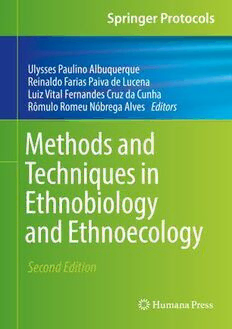Table Of ContentUlysses Paulino Albuquerque
Reinaldo Farias Paiva de Lucena
Luiz Vital Fernandes Cruz da Cunha
Rômulo Romeu Nóbrega Alves Editors
Methods and
Techniques in
Ethnobiology
and Ethnoecology
Second Edition
S P H
PRINGER ROTOCOLS ANDBOOKS
Forfurther volumes:
http://www.springer.com/series/8623
Methods and Techniques
in Ethnobiology and Ethnoecology
Second Edition
Edited by
Ulysses Paulino Albuquerque
Departamento de Botânica, Universidade Federal de Pernambuco, Recife, Brazil
Reinaldo Farias Paiva de Lucena
Departamento de Sistemática e Ecologia, Universidade Federal da Paraiba, João Pessoa, Paraíba,
Brazil
Luiz Vital Fernandes Cruz da Cunha
Departamento de Ciências Biológicas, Universidade Católica de Pernambuco, Recife, Brazil
Rômulo Romeu Nóbrega Alves
Departamento de Biologia, Universidade Estadual da Paraíba, Campina Grande, Brazil
Editors
UlyssesPaulinoAlbuquerque ReinaldoFariasPaivadeLucena
DepartamentodeBotaˆnica DepartamentodeSistema´ticaeEcologia
UniversidadeFederaldePernambuco UniversidadeFederaldaParaiba
Recife,Brazil Jo˜aoPessoa,Para´ıba,Brazil
LuizVitalFernandesCruzdaCunha RoˆmuloRomeuNo´bregaAlves
DepartamentodeCieˆnciasBiolo´gicas DepartamentodeBiologia
UniversidadeCato´licadePernambuco UniversidadeEstadualdaPara´ıba
Recife,Brazil CampinaGrande,Brazil
ISSN1949-2448 ISSN1949-2456 (electronic)
SpringerProtocolsHandbooks
ISBN978-1-4939-8918-8 ISBN978-1-4939-8919-5 (eBook)
https://doi.org/10.1007/978-1-4939-8919-5
LibraryofCongressControlNumber:2018959858
©SpringerScience+BusinessMedia,LLC,partofSpringerNature2019
Thisworkissubjecttocopyright.AllrightsarereservedbythePublisher,whetherthewholeorpartofthematerialis
concerned,specificallytherightsoftranslation,reprinting,reuseofillustrations,recitation,broadcasting,reproduction
onmicrofilmsorinanyotherphysicalway,andtransmissionorinformationstorageandretrieval,electronicadaptation,
computersoftware,orbysimilarordissimilarmethodologynowknownorhereafterdeveloped.
Theuseofgeneraldescriptivenames,registerednames,trademarks,servicemarks,etc.inthispublicationdoesnotimply,
evenintheabsenceofaspecificstatement,thatsuchnamesareexemptfromtherelevantprotectivelawsandregulations
andthereforefreeforgeneraluse.
Thepublisher,theauthors,andtheeditorsaresafetoassumethattheadviceandinformationinthisbookarebelievedto
betrueandaccurateatthedateofpublication.Neitherthepublishernortheauthorsortheeditorsgiveawarranty,
expressorimplied,withrespecttothematerialcontainedhereinorforanyerrorsoromissionsthatmayhavebeenmade.
Thepublisherremainsneutralwithregardtojurisdictionalclaimsinpublishedmapsandinstitutionalaffiliations.
This Humana Press imprint is published by the registered company Springer ScienceþBusiness Media, LLC part of
SpringerNature.
Theregisteredcompanyaddressis:233SpringStreet,NewYork,NY10013,U.S.A.
Overview
Ethnobiology and ethnoecology have become very popular in recent years. Particularly in
the last 25 years, several manuals of methods have been prepared and comprised the most
classical approaches to the subject. However, there have been many advances in research
becauseofinteractionwithdifferentdisciplinesbutalsoduetonew,original,andinteresting
questions. When we published the first edition of Methods and Techniques in Ethnobiology
and Ethnoecology (Springer/Humana Press, 2014), we were focused on presenting to the
reader the most popular and usual approaches as well as the methods of disciplines that
interactwithethnobiology,suchas ecology,microbiology, andphytochemistry.Theinten-
tionwasthateachchaptershouldbeascriptthatwouldallowtheresearchertoknoweachof
the methods described in the literature as well as to make the best choices for their own
research.
The vision for this handbook is to provide the current state-of-the-art methods and
techniques that are applied in the research and related fields of anyone interested in
ethnobiology and ethnoecology. This new volume, besides bringing new and original
aspects of what is found in the literature, fills some of the gaps not covered in volume
1(firstedition).Wedividedthebookinto4partscoveringatotalof21newchapters.Inthe
first part, we approached the most systematic treatment of methods and techniques in
qualitative research. The chapters cover everything from the initial stages of preparing a
research to the initial methods of treating and analyzing the data. In the second part, we
delve into quantitative approaches from a more detailed discussion on the use of the
hypothetico-deductive method and univariate and multivariate statistical approaches in
ethnobiologyresearch.Inthethirdpart,thechaptersaddressthetheoreticalandmethodo-
logicalchallengesofethnobiologyanditsinteractionwithspecificfieldsofknowledge,such
ashistoricalecology.Inthelatterpart,thechaptersprovideadescriptionofmethodsusedin
otherdisciplinessuchasphytochemistry,ecology,zoology,andconservationbiology.Along
withthevariousmethodscoveredineachchapter,thehandbookalsoincludesanextensive
bibliographythatdetailsthecurrentliteratureavailableinthefield.
Recife,Brazil UlyssesPaulinoAlbuquerque
Joa˜oPessoa,Paraı´ba,Brazil ReinaldoFariasPaivadeLucena
Recife,Brazil LuizVitalFernandesCruzdaCunha
CampinaGrande,Paraı´ba,Brazil RoˆmuloRomeuN(cid:1)obregaAlves
v
Acknowledgments
Adebtofgratitudeisowedtomanypeoplewhoassistedonthepreparationofthisbook.We
thankalltheauthorswhoacceptedourinvitationtowritethechaptersforthisnewedition.
WeareespeciallygratefultotheNationalCouncilforScientificandTechnologicalDevelop-
ment (CNPq) for financial support in the form of scholarships for scientific productivity
providedtoRRNAandUPA.SomeofthechaptersincludedweresupportedbytheNational
Institute of Science and Technology in Ethnobiology, Bioprospecting and Nature Conser-
vation, certified by CNPq, with financial provision from FACEPE (Foundation for the
SupportofScienceandTechnologyoftheStateofPernambuco-APQ-0562-2.01/17).
vii
Contents
Overview ................................................................... v
Acknowledgments............................................................. vii
Contributors................................................................. xiii
PART I METHODS AND QUALITATIVE TECHNIQUES
1 PreparationofQualitativeResearch ....................................... 3
JoelsonMorenoBritoMoura,RisoneideHenriquesdaSilva,
NylberAugustodaSilva,DanielCarvalhoPires deSousa,
andUlyssesPaulinoAlbuquerque
2 ImplementingEthnobiologicalResearch:Pretests,QualityControl,
andProtocolReviews.................................................... 15
Tem(cid:1)oteoLuizLimadaSilva,JoelsonMorenoBritoMoura,
JulianeSouzaLuizHora,EdwineSoaresdeOliveira,
Andre´dosSantosSouza,NylberAugustodaSilva,
andUlyssesPaulinoAlbuquerque
3 ParticipantObservationandFieldJournal:WhentoUse
andHowtoAnalyze .................................................... 25
JulianaLoureiroAlmeidaCampos,TalineCristinadaSilva,
andUlyssesPaulinoAlbuquerque
4 AudioandVideoRecordingTechniquesforEthnobiologicalResearch ........ 35
SimonedeHekandAnaLadio
5 QualitativeDataAnalysis................................................. 45
DanielCarvalhoPiresdeSousa,HenriqueFernandesMagalha˜es,
EdwineSoares deOliveira,andUlyssesPaulinoAlbuquerque
6 DiscourseoftheCollectiveSubjectasaMethodforAnalysisofData
inEthnobiologicalResearch.............................................. 55
IzabelCristinaSantiagoLemos,GyllyandesondeArau´joDelmondes,
Di(cid:1)ogenesdeQueirozDias,IrwinRoseAlencardeMenezes,
GeorgePimentelFernandes,andMartaReginaKerntopf
PART II METHODS AND QUANTITATIVE TECHNIQUES
7 GoingBacktoBasics:HowtoMaster theArtofMakingScientifically
SoundQuestions ....................................................... 71
ThiagoGonc¸alves-Souza,DiogoB.Provete,MichelV.Garey,
FernandoR.daSilva,andUlyssesPaulinoAlbuquerque
8 MultidimensionalAnalysesforTestingEcological,Ethnobiological,
andConservationHypotheses............................................ 87
ThiagoGonc¸alves-Souza,MichelV.Garey,FernandoR.daSilva,
UlyssesPaulinoAlbuquerque,andDiogoB.Provete
ix
x Contents
9 TheUseofMultivariateToolsinStudiesofTraditionalEcological
KnowledgeandManagementSystems..................................... 111
CristinaBaldaufandNiveaDiasdosSantos
10 TheSpatiotemporalScaleofEthnobiology:AConceptual
ContributionintheApplicationofMeta-AnalysisandtheDevelopment
oftheMacro-EthnobiologicalApproach................................... 127
TaniaVianneyGutie´rrez-Santilla´n,DavidValenzuela-Galva´n,
UlyssesPaulinoAlbuquerque,FranciscoReyes-Zepeda,
LeonardoUrielArellano-Me´ndez,ArturoMora-Olivo,
Luis-BernardoVa´zquez
11 CollectionandAnalysisofEnvironmentalRiskPerceptionData .............. 149
HenriqueFernandesMagalha˜es,ReginaCe´liadaSilvaOliveira,
IvanildaSoaresFeitosa,andUlyssesPaulinoAlbuquerque
PART III METHODOLOGICAL AND THEORETICAL CHALLENGES
12 EthnoecologyinPluriculturalContexts:TheoreticalandMethodological
Contributions.......................................................... 163
JulioA.Hurrell,PabloC.Stampella,Marı´aB.Doumecq,
andMarı´aL.Pochettino
13 EthnobotanyandEthnoecologyAppliedtoHistoricalEcology............... 187
MarianaFrancoCassino,RubanaPalhares Alves,CarolinaLevis,
JenniferWatling,Andre´BragaJunqueira,MyrtleP.Shock,
MariaJuliaFerreira,VictorLeryCaetanoAndrade,LauraP.Furquim,
SaraDeambroziCoelho,EduardoKazuoTamanaha,EduardoG(cid:1)oesNeves,
andCharlesR.Clement
14 ChallengesinEthnozoologicalResearch................................... 209
RoˆmuloRomeuN(cid:1)obregaAlvesandWedsonMedeirosSilvaSouto
15 BioculturalCollectionsandParticipatoryMethods:Old,Current,
andFutureKnowledge .................................................. 215
VivianeSterndaFonseca-Kruel,LucianaMartins,AloisioCabalzar,
ClaudiaLeonorL(cid:1)opez-Garce´s,Ma´rliaCoelho-Ferreira,
Pieter-JanvanderVeld,WilliamMilliken,andMarkNesbitt
16 ProtocolsandEthicalConsiderationsinEthnobiologicalResearch............ 229
SofiaZank,RafaelaHelenaLudwinsky,GrazielaDiasBlanco,
andNataliaHanazaki
PART IV METHODS AND TECHNIQUES OF RELATED AREAS
17 MethodsintheExtractionandChemicalAnalysisofMedicinalPlants......... 257
AkramM.Salam,JamesT.Lyles,andCassandraL.Quave
18 EvaluationoftheAntibacterialandModulatoryActivities
ofZootherapeutics...................................................... 285
Di(cid:1)ogenesdeQueirozDias,De´boraLimaSales,FelipeSilvaFerreira,
IzabelCristinaSantiagoLemos,GyllyandesondeArau´joDelmondes,
RenataEvaristoRodriguesSilva,Jose´GalbertoMartinsdaCosta,
MartaReginaKerntopf,HenriqueDouglasMeloCoutinho,
RoˆmuloRomeuN(cid:1)obregaAlves,andWalte´ciodeOliveiraAlmeida
Contents xi
19 PopulationEcologyofPlantSpeciesSubjectedtoExtractivism:
CollectionandDataAnalysisMethods .................................... 293
JulianaLoureiroAlmeidaCampos,IvanildaSoaresFeitosa,
andUlyssesPaulinoAlbuquerque
20 NoninvasiveSamplingTechniquesforVertebrateFauna ..................... 309
LeonardodaSilvaChaves,ChristiniBarbosaCaselli,
RafaeldeAlbuquerqueCarvalho,andRoˆmuloRomeuN(cid:1)obregaAlves
21 TechniquestoEvaluateHuntingSustainability ............................. 323
LeonardodaSilvaChaves,ChristiniBarbosaCaselli,
Andre´LuizBorbaNascimento,andRoˆmuloRomeuN(cid:1)obregaAlves
Index ...................................................................... 335
Contributors
ULYSSESPAULINOALBUQUERQUE (cid:2) Laborat(cid:1)oriodeEcologiaeEvoluc¸a˜odeSistemas
Socioecol(cid:1)ogicos(LEA),DepartamentodeBotaˆnica,CentrodeBiocieˆncias,Universidade
FederaldePernambuco,Recife,Pernambuco,Brazil
RAFAELDEALBUQUERQUECARVALHO (cid:2) DepartmentofGenetics,UniversidadeFederaldoRio
GrandedoSul,PortoAlegre,RioGrandedoSul,Brazil
RUBANA PALHARESALVES (cid:2) ProgramadeP(cid:1)osGraduac¸a˜oemEcologia,InstitutoNacionalde
PesquisasdaAmazoˆnia(INPA),Manaus,Amazonas,Brazil
VICTORLERYCAETANOANDRADE (cid:2) DepartmentofArchaeology,MaxPlanckInstitutefor the
ScienceofHumanHistory,Jena,Thu¨ringen,Germany
GYLLYANDESONDEARAU´JODELMONDES (cid:2) DepartmentofBiologicalChemistry/CCBS,
RegionalUniversityofCariri(URCA),Crato,Ceara´,Brazil
LEONARDOURIEL ARELLANO-ME´NDEZ (cid:2) InstitutodeEcologı´aAplicada,Universidad
Aut(cid:1)onomadeTamaulipas,CiudadVictoria,Tamaulipas,Mexico
CRISTINABALDAUF (cid:2) DepartmentofBiosciences,FederalRuralUniversityofSemiarid
Region(UFERSA),Mossor(cid:1)o,RioGrandedoNorte,Brazil
GRAZIELADIASBLANCO (cid:2) Laborat(cid:1)oriodeEcologiaHumanaeEtnobotaˆnica,ECZ/CCB,
UniversidadeFederaldeSantaCatarina,Florian(cid:1)opolis,SantaCatarina,Brazil
ALOISIO CABALZAR (cid:2) ProgramaRioNegro,InstitutoSocioambiental,Sa˜oPaulo,SP,Brazil
JULIANALOUREIROALMEIDACAMPOS (cid:2) Laborat(cid:1)oriodeEcologiaeEvoluc¸a˜odeSistemas
Socioecol(cid:1)ogicos,DepartamentodeBotaˆnica,UniversidadeFederaldePernambuco,Recife,
Pernambuco,Brazil
CHRISTINIBARBOSACASELLI (cid:2) BiologyDepartment,UniversidadeFederalRuralde
Pernambuco,Recife,Pernambuco,Brazil
MARIANA FRANCOCASSINO (cid:2) Laborat(cid:1)oriodeArqueologia,InstitutodeDesenvolvimento
Sustenta´velMamiraua´ (IDSM),Tefe´,Amazonas,Brazil
CHARLESR.CLEMENT (cid:2) Coordenac¸a˜odeTecnologiaeInovac¸a˜o,InstitutoNacionalde
PesquisasdaAmazoˆnia(INPA),Manaus,Amazonas,Brazil
SARADEAMBROZICOELHO (cid:2) ProgramadeP(cid:1)osGraduac¸a˜oemEcologia,InstitutoNacionalde
PesquisasdaAmazoˆnia(INPA),Manaus,Amazonas,Brazil
MA´RLIA COELHO-FERREIRA (cid:2) Coordenac¸a˜odeBotaˆnica,MuseuParaenseEmı´lioGoeldi,
Bele´m,Para´,Brazil
HENRIQUEDOUGLASMELOCOUTINHO (cid:2) RegionalUniversityofCariri,Crato,Ceara´,Brazil
JOSE´ GALBERTOMARTINSDACOSTA (cid:2) RegionalUniversityofCariri,Crato,Ceara´,Brazil
MARI´AB.DOUMECQ (cid:2) LaboratoriodeEtnobota´nicayBota´nicaAplicada(LEBA),Facultad
deCienciasNaturalesyMuseo(FCNM),UniversidadNacionaldeLaPlata(UNLP),La
Plata,BuenosAires,Argentina;ConsejoNacionaldeInvestigacionesCientı´ficasyTe´cnicas
(CONICET),LaPlata,BuenosAires,Argentina
IVANILDASOARESFEITOSA (cid:2) DepartamentodeBiologia,ProgramadeP(cid:1)os-graduac¸a˜oem
EtnobiologiaeConservac¸a˜odaNatureza,UniversidadeFederalRuraldePernambuco,
Recife,Pernambuco,Brazil
FELIPESILVAFERREIRA (cid:2) FederalUniversityofSanFranciscoValley,SenhordoBonfim,Bahia,
Brazil
xiii

